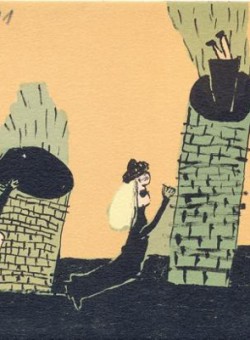Jacques Rossi (1909 – 2004) was born in France, but spent most of his youth in Poland. In Poland he joined the Communist Party and thanks to his outstanding language skills (not only could he speak a number of European language, but also Persian, Hindu and Chinese) he became an agent-courier for Comintern. He set up an illegal transmitter during the Civil War in Spain. In 1937 he was sent to Moscow, where he was arrested and accused of counterrevolutionary activity and espionage against the Soviet Union. Without trial, he ended up in Siberia, where he spent 18 years in a gulag, and then 5 years in exile in Samarkand. He was released in 1961 and left for Poland where he lived until 1980. In 1986 he returned to France in 1986. He lived Paris until his death in 2004.
This interview took place in Paris in November 1999. The interview is reprinted from the Czech Institute for the Study of Totalitarian Regimes publication.
What attracted you to communism?
For me, Poland was a rural and underdeveloped country where people lived under the enormous influence of the Catholic clergy… In this regard, I was more attracted to Germany until Hitler became their leader. There was a strong working class, organized labor, a breeding ground for further party influence, and for left-oriented intellectuals. Germany, moreover, shattered by the postwar economic crisis and unjust reparations was fertile ground for a communist revolution. Indeed, it was in Germany that I entered the service of the Comintern.
Did you go to the Soviet Union for ideological training?
No. I visited the Soviet Union a few years after I had started working for the Comintern. I studied Persian and Chinese at the Moscow Institute of Eastern Languages, as these languages would be beneficial for the tasks that I would be assigned.
In every country that I lived in, I had contact with someone who would “drive” me. Upon arrival, I would contact him on the phone or through encrypted letters. It was mostly in cafes, usually once a fortnight. This person would give me instructions, information, money for travel and living expenses, and new documents if they were needed.
What kinds of tasks were you assigned?
Usually, I transported microfilms that contained encrypted information and instructions. Sometimes it was just money. As I have mentioned previously, the exception was the Civil War in Spain, when I was in Valladolid for a longer time and I was running an illegal transmitter to transmit news and information to comrades who were fighting against Franco and his supporters.
What was Europe like in the thirties?
Wherever I went, I saw that the continent was restless.
Communists and Bolshevik Russians said that the basis of the Marxist doctrine was the establishment of social justice, removing poverty, and building a new world. This was something I longed for with all my heart, and it was therefore logical for me to join them and become a fanatical militant. I put myself on a path that I felt was right. Is there any other job like this that exists for a young person, which he regards as right and just?
I would use my free time to deepen my knowledge of the language, as I did, for example in the University of Cambridge or the National Institute of Oriental Language and Civilization at the University of Paris. So the way I saw it, I had no free time – I was there to serve the world revolution.
In the Western press, which during your time you must have read and followed, a distinctive story about the Soviet Union had begun to emerge, which was rather different to what young communists such as yourself had dreamed of. I am referring to, for example, news about forced collectivization, the deliberate famine in Ukraine, purges and imprisonment. How did you react to such articles?
I saw it as bourgeois propaganda vilifying the Soviet Union. Of course I did not believe anything they wrote. That said, I was aware of the existence of so-called ‘re-education camps’ from Soviet propaganda, in which enemies of the Soviet Union were imprisoned for a short time for re-education.
The people from Comintern in Moscow took very good care of us. Only later did I notice that people on the streets of Moscow or on public transport were behaving strangely; they were very closed off. I also saw poverty and beggars, although that was something I didn’t want to see.
When I was later arrested in Lubyanka, and the inmates in my cell told me that beating and torture were commonplace, I just laughed at them. According to Soviet propaganda, prisoners were neither beaten nor tortured, just re-educated. One day, one of us was leading the guard away and for a moment the doors were open. I heard the cries of a man being beaten up. The inmates then turned around and said, “Did you hear that?”, but I did not hear it. Or rather, I did not want to. The same way I did not want to acknowledge what really went on when I was at the Moscow Trials, as it did not match the so-called ‘bright future’ that I had imagined.
published: 8. 11. 2015







